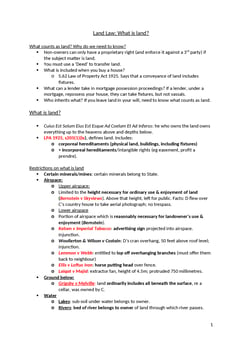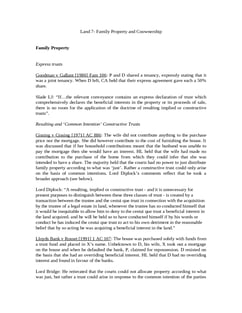Yeoman’s Row v Cobbe [2008] 1 WLR 1752
Judgement for the case Yeoman’s Row v Cobbe
KEY POINTS
Proprietary estoppel is a legal doctrine that may arise when a person (the claimant) has reasonably relied upon assurances or representations made by another party (the defendant) regarding their rights or interests in property, and as a result, has suffered detriment.
-
Proprietary estoppel requires three essential elements:
An assurance or representation made by the defendant to the claimant regarding the claimant's interest in the property,
Reasonable reliance on the assurance by the claimant, and
Detriment suffered by the claimant as a result of their reliance.
Importantly, the court clarified that proprietary estoppel does not create a new legal right but operates as an equity to prevent the unconscionable denial of an existing right or interest.
FACTS
In the present case, Yeoman's Row Management Ltd (A) is the appellant company, while Mr. Cobbe (B) is the respondent, an experienced property developer. The property in question is a block of thirteen flats, one of which has been occupied by Mrs. Lisle-Mainwaring since 1983.
Mr. and Mrs. Lisle-Mainwaring decided to purchase the property recognizing its development potential. They used the appellant company as the vehicle for the purchase. Negotiations between Mr. Cobbe and Mrs. Lisle-Mainwaring began in February 2001, leading to an oral agreement in principle, referred to as the second agreement, in late 2002.
-
The core terms of the second agreement were as follows:
Mr. Cobbe would bear the expenses for obtaining planning permission to demolish the flats and construct a terrace of six houses.
Upon obtaining planning permission and vacant possession, the property would be sold to Mr. Cobbe or his nominated company for an upfront payment of £12 million.
Mr. Cobbe or the nominated company would develop the property according to the approved plans.
Half of the amount exceeding £24 million from the sale of the six houses would be paid to the appellant.
The oral agreement did not cover all the details that would typically be included in a formal written contract.
Planning permission was granted, but sometime later, Mrs. Lisle-Mainwaring expressed dissatisfaction with the financial terms and demanded an upfront price of £20 million and changes to the appellant's share of the proceeds. After initially agreeing to the changes, Mr. Cobbe later withdrew his agreement, leading to an impasse. As a result, Mr. Cobbe initiated legal proceedings.
COMMENTARY
The decision reinforces the importance of equitable principles in property law. It highlights the potential for proprietary estoppel to protect the interests of individuals who have relied on assurances or representations made by others in property transactions.
The case underscores the significance of good faith and fair dealing in negotiations and emphasises the need for parties to clearly document their intentions and agreements to avoid disputes and potential claims based on proprietary estoppel.
ORIGINAL ANALYSIS
The claimant had entered into an oral (unenforceable) agreement with defendants in connection with the redevelopment of their property.
The defendants’ unconscionable behaviour in withdrawing from the agreement once planning permission for the redevelopment had been obtained did not result in a proprietary estoppel or a constructive trust in favour of the claimant.
Lord Scott
Proprietary estoppel is just a species of the ordinary form of estoppel: It prevents A from denying that which he represented to be true.
Therefore it cannot be a means of acquiring rights itself here, since all the defendant is estopped from denying is the existence of an unenforceable agreement.
Lord Walker
The courts should be slow to introduce uncertainty into commercial transactions by oveready use of equitable concepts such as fiduciary obligations and equitable estoppel.
Proprietary estoppel can be a means of acquiring rights, but the claimant must have an actual ‘expectation’ of acquiring rights, rather than just a ‘mere hope’, as here.
Hence the agreement had to have been ‘binding and irrevocable’.
RELATED CASES
For Further Study on Yeoman’s Row v Cobbe

A collection of the best GDL notes the director of Oxbridge Notes (an O...
Need instant answers? Our AI exam tutor is here to help.
Ask questions 🙋 Get answers 📔 It's simple 👁️👄👁️
Our AI is educated by the highest scoring students across all subjects and schools. Join hundreds of your peers today.
Get StartedRelated Product Samples
These product samples contain the same concepts we cover in this case.
| Land Law | Estoppel Notes (10 pages) |
| GDL Land Law | Proprietary Estoppel Notes (8 pages) |
| GDL Land Law | Proprietary Estoppel Notes (4 pages) |

 Since 2010, Oxbridge Notes has been a trusted education marketplace, supplying high-quality materials from top achievers at universities like Oxford, Cambridge, LSE, Harvard, and Yale.
Since 2010, Oxbridge Notes has been a trusted education marketplace, supplying high-quality materials from top achievers at universities like Oxford, Cambridge, LSE, Harvard, and Yale.